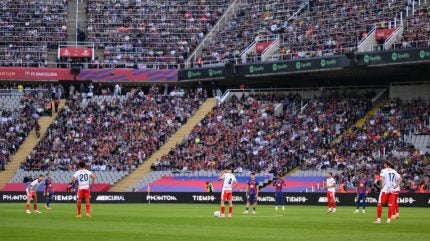
On October 22, just two weeks after LaLiga announced plans to stage its first-ever regular-season match outside Spain — Barcelona vs. Villarreal at Miami’s Hard Rock Stadium on 20 December — organizers confirmed the fixture would not go ahead. The cancellation highlights a recurring inability by LaLiga to deliver on previous attempts to hold domestic matches in the United States.
LaLiga’s interest in staging regular-season matches in the US traces back to 2018, when the league signed a 15-year agreement with the Relevent Sports agency to expand its presence in the US and Canadian markets. The partnership explicitly aimed to promote soccer across North America and included plans to stage regular-season fixtures on US soil as part of that strategy. Attempts to realize this vision have repeatedly encountered obstacles.
The earliest effort involved Girona vs. Barcelona in January 2019, which did not proceed. Subsequent proposals included Villarreal vs. Atlético Madrid in February 2020 and a proposed Barcelona–Atlético Madrid fixture in December 2024; neither materialized. The most recent planned match between Barcelona and Villarreal advanced furthest in planning before ultimately being cancelled.
LaLiga players publicly opposed the prospect of staging a regular-season match in the United States, signalling their dissent by remaining motionless for the opening 15 seconds of matches recently. Broadcasters largely sought to minimize coverage of the protests, using exterior stadium shots and zoomed-in views of the centre circle rather than wide angles that would capture both teams standing still.
Domestic LaLiga broadcaster DAZN, however, did show a full wide-angle view of all 22 players motionless during the Elche–Athletic Club match. LaLiga’s apparent reluctance to highlight the demonstrations is unsurprising given the potential reputational and commercial implications.
Several explanations have been offered for the cancellation, including insufficient time to organize the event and mounting uncertainty in Spain arising from player protests. Because staging the Miami fixture would have required Villarreal to forfeit a designated home match, the fixture will now be held as originally scheduled at Estadio de la Cerámica.

US Tariffs are shifting - will you react or anticipate?
Don’t let policy changes catch you off guard. Stay proactive with real-time data and expert analysis.
By GlobalDataLaLiga is clearly intent on staging regular-season matches outside Spain, with a particular focus on the United States. Soccer’s popularity in the US is rising, and LaLiga aims to promote and expand its brand across North America. Although the league includes two of the world’s most prominent clubs, Barcelona and Real Madrid, LaLiga has historically trailed the English Premier League in overall popularity and commercial revenue.
The push to stage fixtures abroad appears designed to reclaim market share in territories long dominated by the Premier League and to accelerate international growth and revenue diversification.
GlobalData’s recent Business of LaLiga 2025/26 report outlines the strategic benefits LaLiga could realize by staging a regular season match in the United States. From a commercial standpoint, Barcelona’s substantial US following represented a clear asset: a high-profile appearance in Miami would have amplified brand visibility, deepened fan engagement, and supported media and sponsorship negotiations in North America.
For the host city, the match had the potential to offer tangible economic upside—incremental tourism, hotel occupancy, and local spending as domestic and international supporters travelled to attend what would have generated measurable short-term revenue.
For Villarreal specifically, the fixture presented a distinct revenue opportunity. With one of the smallest home grounds in LaLiga, the club stood to gain disproportionately from a relocated, higher-capacity event through elevated ticket sales, hospitality packages, and international merchandising.
For the club’s fans, however, losing a home match would have likely left them feeling neglected as their team has prioritised an ‘international’ fixture. According to StubHub, the cheapest ticket price for the match was $320; a price point likely to exclude many local followers and to frame the initiative as commercially driven rather than fan centric. The move carried reputational and fan-relations costs.
Although LaLiga’s proposed US fixture will not proceed, Italy’s Serie A is moving forward with plans to stage a regular-season match between AC Milan and Como in Perth, Australia, early next year. Reports and speculation suggest that the league fixture could face similar obstacles and might yet be cancelled.
Nonetheless, the broader trend is clear: European domestic leagues are actively exploring cross-border fixtures as a strategic tool to grow global audiences and revenue.
The Premier League currently has no announced plans to stage regular season matches abroad, but this position has not been fixed historically. In 2008, the league proposed an additional round of fixtures—dubbed “Game 39”—to be played at neutral venues outside England, with a view to introducing it in the 2010–11 season. By 2010, the proposal had been formally abandoned, though the episode demonstrates that the league has previously entertained cross-border concepts.
The possibility of such a move in the future cannot be dismissed. 11 Premier League clubs are now majority-owned by US investors—approaching the threshold of 14 clubs required to effect governance changes—creating a pathway for policy shifts that could favour international fixtures.
Several of these owners also hold stakes in major US sports franchises across the NBA, MLB, and other leagues, increasing the strategic alignment and operational experience needed to execute overseas events.
For now, LaLiga teams will not be playing official regular season matches in the US, but it seems inevitable that European soccer leagues will eventually cross the Atlantic. The commercial appeal of the US market is simply too strong to ignore, and with preseason tours already a regular feature, staging competitive fixtures there feels less like a question of if, and more a matter of when.





